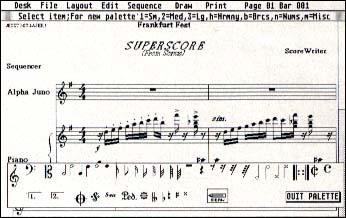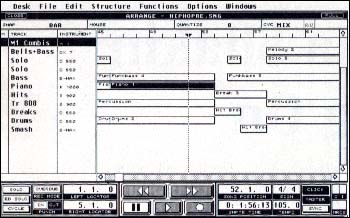The ST/MIDI Connection
Whole Lotta Shakin' Going On
BY JIM PIERSON-PERRY
START MUSIC/MIDI EDITOR
The floodgates opened this month: lots of new software, the ST prepares to take on IBM MIDI software (literally), multitasking arrives and a MIDI/BASIC language is launched.
New and Notable
Let's start with a welcome for Sound Quest of Toronto. This premier Amiga MIDI software firm has brought its extensive line of patch editor programs (Master series) to the ST. Not content with simple porting, they rewrote parts of the ST operating system to improve performance. Standard features include mouse-controlled patch auditioning, graphical envelope editing and three types of random/controlled patch creation. The initial set of programs cover: Yamaha DX/TX7, DX7II/TX802, DX11/ TX81Z, FB01; Roland D50, D10/20/110, MT32; Oberheim Matrix 6/1000; Ensoniq SQ-80/ESQ1; Korg M1; Kawai K1 and Casio CZ series.
Big Noise Software is another new comer to the ST MIDI ranks. Their first release is a patch editor/librarian for the Korg M1.
 |
| Score editing page from SuperScore, the combination sequencer/scor- ing program from Sonus. Changes made on the score are immediately reflected in the sequence data. Shown at the bottom is the palette for drawing musical symbols. |
MusicSoft is expanding from their base of patch editor programs to offer Hit List. This acts as a cue sheet, working with standard MIDI file format files to aid in film scoring. Coming soon is a completely rewritten upgrade of MusicSoft's popular MIDI Drummer program, a universal drum sequencer. On the hardware side, they now offer MIDIMAN. About the size of a paperback, MIDIMAN is a MIDI data tape recorder interface that is capable of recording/playing virtually any MIDI data to a cassette tape. You could perfect your sequences, drum patterns and sysex data at home with your ST, then download them to MIDIMAN to take to gigs. Much easier than carting a computer system around!
The latest offering from Music Service Software is a dedicated librarian program for the Akai S700/X7000 sampler. Author Dean Richard also provides the Data Dumpstor and the TR707 Dumpstor, two other good librarian programs.
Cubase (formerly Cubit) is now shipping from Steinberg/Jones. This is a "third generation" sequencer based on their new M-ROS MIDI multitasking operating system. It offers a host of new features such as controller chasing and remapping, simultaneous recording of up to four players on separate tracks, real-time simulation of delay and reverb effects, editing a score display while the sequencer is playing and a superb graphical environment. Also released is the first set of programs in the X-Syn modular patch editor series (previously available through Beam Team). Your initial purchase gives you the master controller program and two modules, where a module has the "brains" for a specific synthesizer. Inexpensive individual modules can be purchased as needed. They are loaded and unloaded from within the master controller letting you build a composite patch editor/librarian package tailored to your particular instrument setup. The initial set of modules available are for the Yamaha DX/TX7, DX21/27/ 100 and FB-01; Roland JX8P and MT32; Oberheim Matrix 6/1000 and Casio CZ.
 |
| The workscreen from Cubase, the new sequencer from Steinberg/Jones built around their M-ROS MIDI multitasking operating system. Note the dialog box from the Synthworks M1 patch editor program running simultaneously with the sequencer. |
Staccato Notes
Pixel Publishing is now shipping version 2.20 of Super Librarian. This generic sysex librarian program comes configured for over 70 instruments and devices and is easily programmed to add configurations for new instruments. Included with it is Clickpad, a desk accessory which provides extensive support for SMPTE and cue sheet calculations, and a SMPTE tutorial guide.
Those looking for sophisticated MIDI data manipulations should check out version 2.0 of the Cartographer from Intelligent Music. This acts as a software emulator of the popular Mapper hardware unit from Axxess. It lets musicians create multiple keyboard split points, reassign controllers, trigger chords from single notes and many other forms of expressive real-time control of the MIDI data stream.
Version 1.4 of Sonus SuperScore program has been released. Highlights of this upgrade are addition of new event editing capabilities, improved rhythmic analysis and beaming algorithms, an Undo command and use of Bezier curves to construct complex slurs. Owners of earlier versions can upgrade by sending in their program disks with a $15 handling fee.
Compu-Mates and Aegix, two early ST MIDI developers, are no longer in business.
IBM MIDI on the ST
The ST community has been eagerly awaiting the release of pc-ditto II from Avant-Garde. This hardware unit plugs inside your ST or Mega and provides full IBM XT software compatibility at AT class speed. Going a major step further, a late summer software upgrade will allow pc-ditto II to emulate the Roland MPU-401 MIDI interface and run IBM MIDI software. The MPU-401 is the accepted MIDI interface standard in the IBM/clone world, so most existing software should be compatible. Other features of this upgrade are support for EGA video, extended memory (break the 640K barrier) and an Epson printer emulator for use with the Atari laser printer. Now if we could just get a version of pc-ditto II that fits inside STACY, we would have the perfect traveling studio for both ST and IBM environments.
Multi Multitasking
Perhaps 1989 is destined to go down as the year of multitasking for the ST. Already three developers have demonstrated the technology with MIDI software, and one is now shipping. The groundwork was laid by Dr. T with the MPE and Hybrid Arts with HybriSwitch. These systems provided a consistent data interchange environment between sequentially-run applications, similar to the Switcher program on the Macintosh.
The new offerings go beyond this to provide true multitasking, applications running simultaneously sharing resources and access to data. First out of the starting block was Steinberg/Jones with M-ROS (MIDI Realtime Operating System). This new operating system was two years in writing and is expected to be ported to Mac and IBM environments. Three MIDI programs now shipping that run under M-ROS are Cubase (sequencer, formerly Cubit), Mimix (automated mixing) and Synthworks M1 (patch editor). Plans are to upgrade all of the Synthworks patch editor programs to M-ROS compatibility, except those for the TX81Z/DX11 and MT32.
Hot on the heels of M-ROS comes the RealTime Studio from Intelligent Music. This music production environment is built around their RealTime sequencer, with two operating system enhancements providing GEM multitasking support: Multi-GEM and MIDI-GEM. Multi-GEM provides the drivers that govern general multitasking between Atari application programs while MIDIGEM coordinates the communications and scheduling functions specific to MIDI. The RealTime sequencer has been shipping as a stand-alone program since earlier this year.
The most recent entry, by only a few months, is Soft Link from C-Lab (distributed in the United States by Digidesign). This was demonstrated at this summer's NAMM show running C-Lab's Creator/Notator sequencer programs simultaneously with other GEM compatible programs.
What does this bode for the user, now looking at a future of multiple developer-specific implementations? Atari has recognized the need to standardize on a single approach to multitasking that all developers could exploit, much the same as the recently introduced MIDI Manager for Macintosh applications. The above systems are under active evaluation by Atari. We can only hope for an early decision so a consolidation process can be started soon.
Back to BASIC
Do any of these situations sound familiar? You really like your sequencer but there are some additional editing features you wish the programmer had included. You have a great idea for a combination graphics/sound program but need more muscle than the ST internal synthesizer sounds and want to hook into MIDI sequences. You have an interest in experimental music (e.g. fractals or Markov chains) that cannot be played from a keyboard but must be computer-generated. These are just a few ideas that you now can explore easily with T-BASIC from Dr. T, a full-blown BASIC language with numerous built-in extensions to handle MIDI and music functions.
The language is a superset of ST BASIC that has been tuned up to run fast enough for realtime graphics and music applications. Provisions were made for structured programming, access to GEM functions (AES, XBIOS, etc.) and all the hooks necessary to tie into Dr. T's KCS sequencer. T-BASIC can be run as a stand-alone application or as part of the KCS multiprogram environment.
T-BASIC runs on all ST/Mega models and comes with a tasty collection of starter programs and demos. The doctor and crew plan to foster user interaction and support by maintaining a library of T-BASIC programs. With the availability of Dr. T's public domain MIDI file converter program, users of most other sequencers could import or export between their native format and the KCS format to use T-BASIC. This is an exciting new tool for Atari MIDI/music explorations that should be well received by both hobbyist and professional users.
START Music/MIDI Editor Jim Pierson Perry is a research chemist and semi-professional musician living in Elkton, Maryland.
PRODUCTS MENTIONED
pc ditto II, $299. AvantGarde Systems, 381 Pablo Point Drive, Jacksonville, FL 32225, (904) 221-2904.
M1 Patch Editor/ Librarian, $119.95. Big Noise Software, Inc., P.O. Box 23740, Jacksonville, FL 32241, (904) 730-0754.
T-BASIC, $149. Dr. T's Music Software, 220 Boylston Street Suite 306, Chestnut Hill, MA 02167, (617) 244-6954.
Cartographer, $200; Realtime, $350. Intelligent Computer Music Systems, Inc., P.O. Box 8748, Albany NY 12208, (518) 434-4110.
Data Dumpstor, $89.95; TR707 Dumpstor, $64.95 S700/X7000 Librarian, $79.95; Music Service Software. 801 Wheeler Road, Madison, W153704, (608) 241 -561 5.
Hit List, $199.95; MIDI Drummer, $99.95; MIDIMAN, $199.95. MusicSoft, 30 North Raymond, Suite 505, Pasadena, CA 91103 (818) 449-8838.
Super Librarian version 2.20, $149. Pixel Publishing, 573 Eglington Avenue West, Suite 3, Toronto, Ontorio, Canada M6E 2G9.
Superscore verison 1.4 $299. Sonus Corp., 21430 Strathern Street, Suite H Canoga Park, CA 91304 (818) 702-0992.
Master Patch Editor/Librarians, $165 each. Sound Quest, 5 Glenaden Avenue, Toronto, Ontario, Canada M8Y 2L2, (416) 234-0347.
Cubase, $495.; Mimix, $595, software only; Synthworks M1, $259.; X-SYN Master Controller and Two Modules, $125; X-SYN Individual Modules, $35 each. Steinberg/Jones, 17700 Raymer Street, Suite 1002, Northridge, CA 91325, (818) 993-4091.